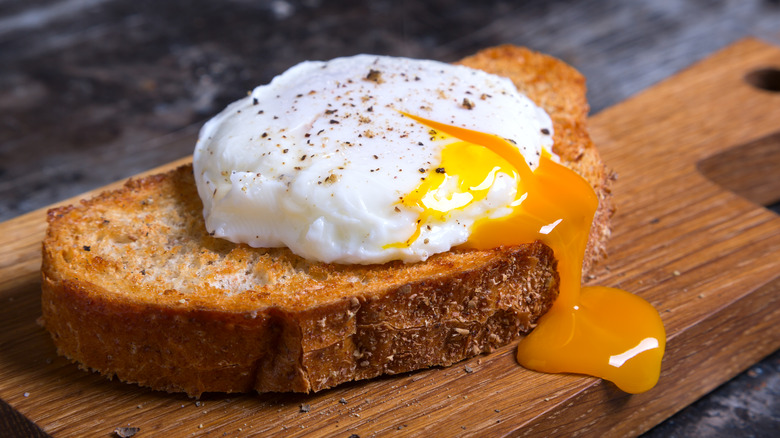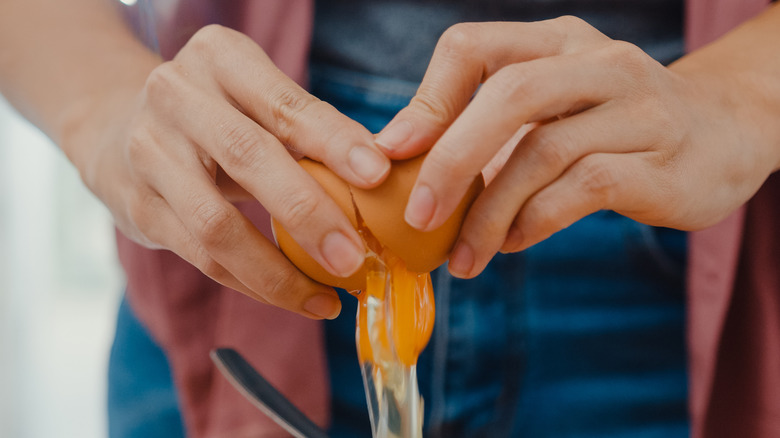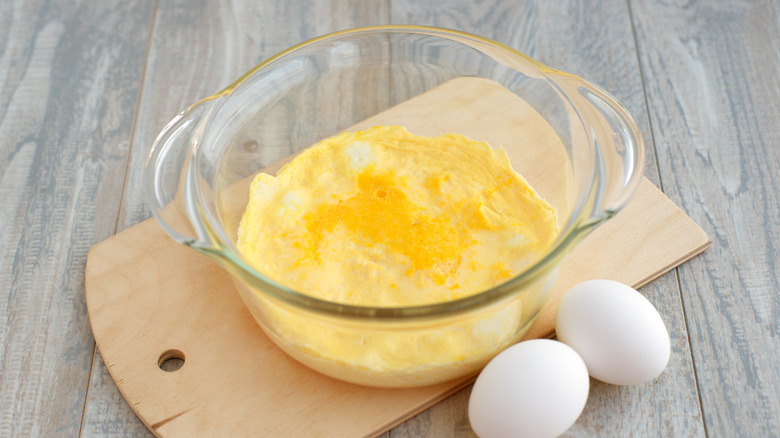Your Microwave Is The Key To Faster Poached Eggs
Chefs offer the everyday home cooks tons of tips for how to poach eggs, but the process — deceptively simple, yet so difficult to master — can still be outstandingly frustrating, especially if you're in a hurry. Who has time to stand over the stove, stirring the water and waiting for it to come up to temp, hoping that the egg will somehow not break this time? As it turns out, there is a way to poach eggs that is much faster and easier: Let your microwave do all the leg work.
Just pour a little bit of water into a mug or a glass measuring cup (make sure it's microwave-safe!), then zap in the microwave until the water is hot, but not boiling. You'll then crack your egg into the water, poke the yolk with a toothpick, and seal some plastic wrap on top of the egg-poaching vessel.
After giving it another whirl in the microwave for about 30 seconds, you should have one perfectly poached egg, which you can carefully transfer to a paper towel to dry before hitting it with salt and pepper (or perhaps some MSG, which also goes great with scrambles). Add it to your toast or asparagus for breakfast or a side, or you could repeat this method for one or two more eggs and serve them up with a hearty, and now upscale, salad. Wow, fancy!
Some tips for microwaving poached eggs
Despite the speed and convenience of poaching your eggs in the microwave, there is a bit of a learning curve, and there are some things you can do to help you get closer to poached egg perfection. First and foremost: Do not skip on the tiny piercing of the yolk, because it helps to prevent the egg from exploding while it's in the microwave. You might be afraid that you will break the yolk and it will completely mix into the white, but just use a toothpick or other small, pointed object and gently insert it into the center, and it should stay intact. While you should also cover your mug or cup to keep your microwave clean, this extra step helps ensure you don't waste an egg.
If you have tried the microwave poaching method and found that your eggs overcook every time, consider adding a pinch of salt to your water. Salt inhibits the water from overheating, letting your egg cook more evenly. You could also add a splash of vinegar to your water to help tighten the egg whites and form a more pronounced outer shell around the yolk (and you can use different cooking vinegars to add a subtle flavor). Finally, it does help if you use the freshest eggs possible, so learn how to tell if the eggs in your fridge are still good.
How else can you cook an egg in the microwave?
If you thought the microwave was only good for poaching your eggs in a hurry, you would be mistaken. This versatile appliance is handy for quick cooking of eggs in a variety of preparations, perfect for when you are in a rush in the morning, or have had a long day and can't summon the energy to make something on the stove.
For example, you can scramble eggs in the microwave, and all you need is a microwave-safe bowl. After beating the eggs, add mix-ins like chopped ham, bacon, or sausage, onions and peppers, or even spinach for a more complete meal. Heat the eggs in short bursts, scrambling in between, until cooked.
You can also beat an egg in a mug or glass measuring cup, season it, pop it in the microwave, and voilà — you have a round egg patty that is ideal for a breakfast sandwich. Cook beaten eggs on a plate in the microwave to make a quick omelet, too. Once the eggs set up, add whatever fillings and toppings you want, and the residual heat will make any cheese you add oh-so-melty.


